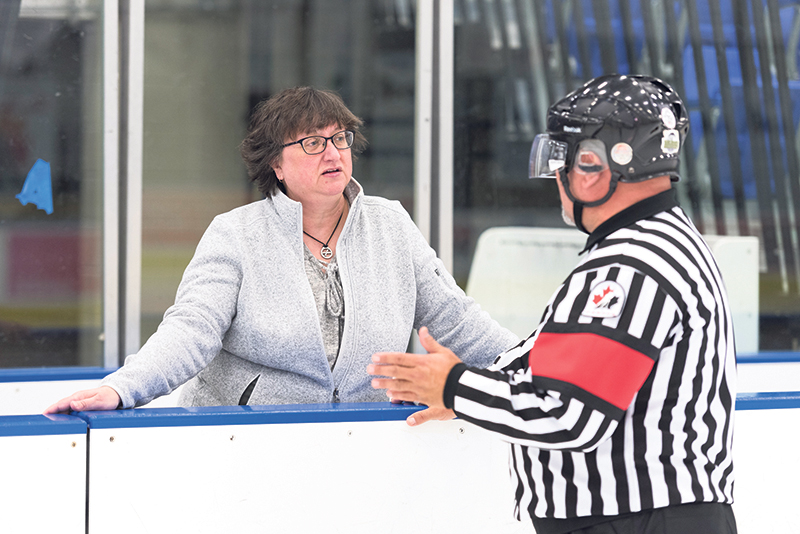Less stress for referees
University of Regina researcher Kim Dorsch is working with hockey referees to achieve better outcomes through mental performance training. SUPPLIED
Better support for sports officials includes training with innovative technology
We’ve all been there: at the edge of our seats and engrossed in a game when the referee’s whistle interrupts the action. What comes next could be greeted with cheers or groans, depending on whether the call is in favour of our team or the opposition.
“Any call an official makes typically pleases half the people,” says Kim Dorsch, a professor in the University of Regina’s Faculty of Kinesiology and Health Studies. “I was watching a [football] game last night and sure enough, people got riled up when the official didn’t call a penalty – and this non-call led to a touchdown.
“Too often, officials are made scapegoats if the outcome isn’t the one we want. But we have to realize that referees have to make very complex cognitive decisions in short periods of time,” she says. “And generally, they don’t have opportunities to practise some of the mental skills needed to make these calls.”
Dr. Dorsch, whose research in the field of sport psychology examines the psychological stressors and coping styles of sports officials, has found that enhanced training can lead to better outcomes for hockey officials.
“Attrition rates are high in most sports, and the loss of qualified officials can have significant financial implications,” she says. “Hockey Canada, for example, is losing about one-third of its officials.”
The first step toward alleviating what Dr. Dorsch calls a “crisis in officiating” is understanding the types of stress referees commonly face. “There are two main categories of competition stressors – one is the fear of making mistakes and the other is the fear of abuse, which could be verbal or even physical abuse coming from players, coaches or spectators,” she explains.
Other stressors can come from working with an officiating team or from being employed by an organization, says Dr. Dorsch. “Last year, for example, a hockey official made a controversial call and was subsequently suspended by the organization – this perceived lack of support can create additional stress.”
All these elements can impact the performance of officials, and they can also lead to resignations. Dr. Dorsch has found that referees encounter different stressors as they move through the various levels of officiating.
“The fear of making mistakes is perceived as the greatest stress factor, even greater than the fear of abuse, especially for referees who are just starting out – it causes officials from many sports to retire,” she says.
Training, however, has proven to be helpful in addressing this particular stressor, Dr. Dorsch says. “Generally, education and training programs for officials focus on rules and communication only – they don’t include cognitive skills training. The only training referees typically receive is during an actual game, when a lot is on the line.”
In partnership with the Saskatchewan Hockey Association, Dr. Dorsch’s team worked with hockey referees to evaluate the use of NeuroTracker, an innovation developed in Montreal, which aims to enhance mental performance by challenging users to track multiple targets moving dynamically in 3D space.
“We had a group of officials go through NeuroTracker training sessions designed to enhance the brain’s attention, executive function, working memory and processing speed – things that were once thought of as not trainable,” she says. “We then brought in hockey supervisors to evaluate their officiating performance and compare it to a control group without knowing who had been training with the device.”
The performance of officials exposed to NeuroTracker sessions was noticeably better, says Dr. Dorsch. “Referees need a wide peripheral awareness. Training devices that hone referees’ abilities to track multiple objects can enable them to see things better on the ice,” she says. “It’s like doing squats for the brain.”
By proving that more can be done to prepare officials for their challenging role, Dr. Dorsch’s research has broad implications, not just for hockey but most competitive sports.
Compared to professional athletes and coaches, referees typically have a low profile. They simply don’t receive the same attention, support or compensation from sports organizations, and Dr. Dorsch aims to shift that balance.
“Qualified officials are essential to the game,” she stresses. “We need to improve outcomes and retention rates for referees by doing more research and offering better tools and training opportunities.”
To view more stories related to this article visit globeandmail.com

